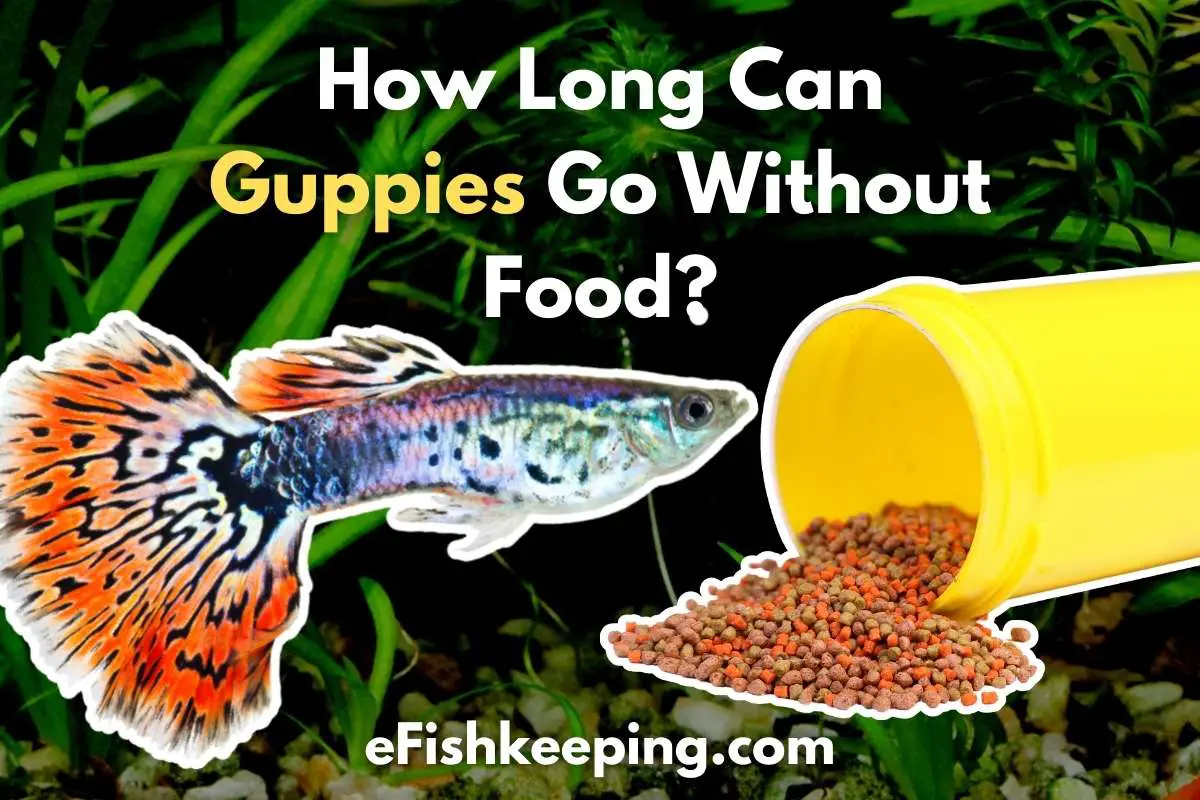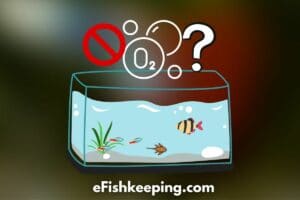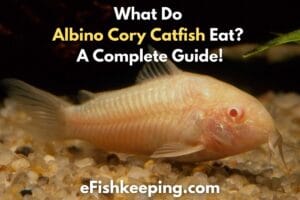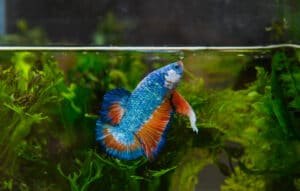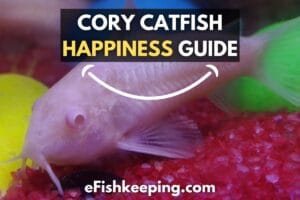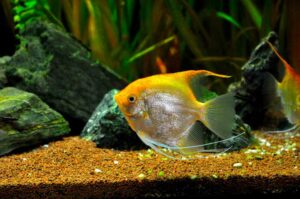Are you planning not to be near your guppies for a few days? Maybe for a vacation or an urgent trip. Don’t have someone to feed your guppies in your absence?
Then most probably, you would be worried about how long your guppies can live without food. Continue reading till the end to get a complete guide on this topic.
Here’s How Long Guppies Can Go Without Food:
As a general rule, guppies can go without food for about 7-10 days. Although the healthy adult guppies can survive up to two weeks, the guppy fry can survive only up to 3 days without food.
Remember that the above recommendation of timeframe is specifically for emergency purposes only. Unless necessary, you shouldn’t leave your guppies without food for more than a day or two.
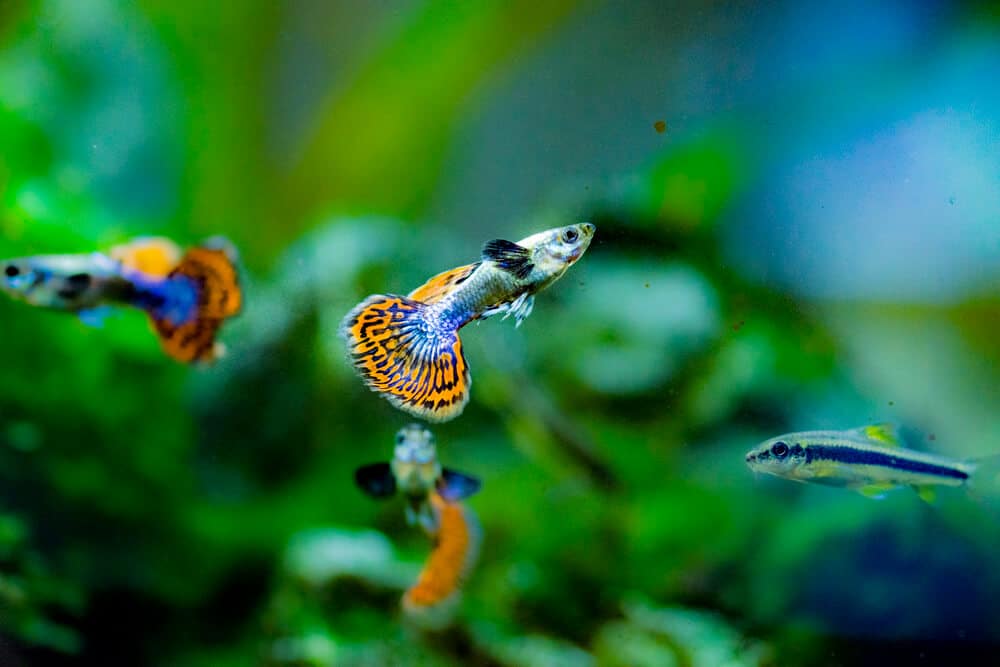
Generally speaking, you should feed adult guppies once or twice a day. However, for baby guppies or fry, you may even have to feed them about 5-8 times each day, mainly because their body goes through various changes and are in a growing phase. (You can also check out my guide on when guppies give birth here)
Now, if you are about to leave for a long trip or vacation, and you are sure that you won’t be returning before 3-4 days or a week, then why take a risk!
I agree that even though guppies may survive for up to two weeks. But still, it is always better to ensure your pet fish are safe at home and get fed properly. Isn’t it?
So how can you ensure that? Let’s see!
How To Feed Guppies When You Are Out Of Home?
#1. Using Automatic Feeders
One of the best ways to feed your guppies while you are out is to use an automatic feeder. The automatic fish feeders are designed to feed your guppies the right amount of food at regular time intervals.
As the name itself suggests, an automatic fish feeder is a device that allows you to feed your guppies without you being near them.
Using an automatic feeder, your fish will not only survive but also grow well and remain healthy in your absence simply because the automatic feeder will continue to feed your guppies regularly.
The automatic fish feeders are battery-operated or run on electricity through a power chord. These devices are usually clamped on the aquarium wall just above the water. Most designs have a hopper loaded with food and a timer that rotates the hopper at regular intervals.
In simple words, the fish feeders have a container and a programmable timer. You need to add dried fish food in the container and program the timer based on when and how often you need your fish to be fed. That’s it! Sounds cool?

This is one of the best automatic fish feeders I would recommend you to have a look (available on Amazon).
#2. Get A Fish Sitter For Your Guppies
The benefit of fish sitters is that they can help do things totally out of the scope of the automatic feeding machines. For instance, the fish sitter can remove a fish that dies accidentally and thus prevent unwanted rot and problems in your aquarium.
Moreover, they can update you about your tank by sending you the pictures. And in case of emergency, they can also call someone knowledgeable to handle that situation effectively and take all the appropriate steps for the safety of your guppies.
Usually, it is good to have fish sitters who have some experience with fishkeeping or doing the same type of work for others. And because of one of these reasons, you should often make friends in this fishkeeping hobby (so that they can help and take care of your fish in your absence.)
You can connect with people in local aquarium clubs. Or, if aquarium clubs are less common in your area, then the local aquarium pet stores can also be an excellent place to make new fishkeeping friends.
The fishkeepers like you often come there to get aquarium food and other aquarium products. At that time, you can usually chat and discuss each other’s aquariums, fish and eventually develop a good friendship.
Now, if you don’t have access to any fish sitter with fishkeeping experience or at least basic knowledge, don’t worry! You can also choose a mature neighborhood kid for this work, maybe who wants to get some side pocket money income.
One caution is that they may overfeed or underfeed, especially if they are new to feeding fish.
So it is always a good idea to prepare servings for your guppies for each day. You can put the feedings in a plastic bag or container and label them appropriately. This way, the fish sitter won’t have to worry much and just follow the instructions and feed appropriately.
#3. Using Vacation Feeders
Now, if you can’t find anyone as your fish sitter and you don’t like to use any gear setup, the last option is to use commercially packed slow-releasing feeding blocks.
These feeding blocks, sometimes called ‘vacation feeders,’ come in various shapes, sizes, and content. They are made to last for a specific time period.
These vacation feeders or feeding blocks can be inexpensive and an effortless way to feed your guppies. The best part is you won’t need any gear setup. And you don’t need to give them any instructions on how to operate.
Usually, most feeding blocks are rated based on the number of days they can last. Also, they can come with directions regarding the size of the aquarium they should be used for and the number of fish they can feed.
So while purchasing a feeding block for your guppies, make sure to read the directions and select the right one based on your requirements.
Although vacation feeders seem to be an easy option, there is also one issue. Some of your fish may ignore the vacation feeder straight away if they don’t like the food.
Now think, if you leave a slow-releasing feeding block/vacation feeder in your aquarium that your guppies don’t like, then what will happen!
Eventually, that uneaten food can get collected in your guppy tank. And remember, uneaten fish food can negatively impact your aquarium. For example, the uneaten fish food can release toxic ammonia or nitrite as it will decompose. Moreover, the uneaten fish food can also clog your filter.
So to avoid all these and ensure that your guppy will like the feeding block, you can try testing out a few feeding blocks.
A few days before you leave for your vacation, you can try and decide which feeding blocks your guppies like the most.
Conclusion
In short, healthy adult guppies can survive up to two weeks, whereas baby guppies or fries can survive up to 3 days. No matter what the situation is, always try to avoid leaving your guppy hungry for more than a day or two.
And still, if the circumstances demand that you have to leave, then ensure that they are appropriately fed by all the ways I shared with you in this article.
I hope you got a clear picture of how long your guppies can be left without food. If you found this article helpful, please share it with others. Thank You, and I wish you a happy fishkeeping day ahead.
Also Read:
Hi! I’m Praveen Ghoshal, the founder of eFishkeeping.com. Inspired by my Dad, I got interested in fishkeeping when I was a kid. Since then, I have been involved with this hobby. Currently, I have 3 fish tanks at our home, and I enjoy this hobby with my full family. Read more about me here.

